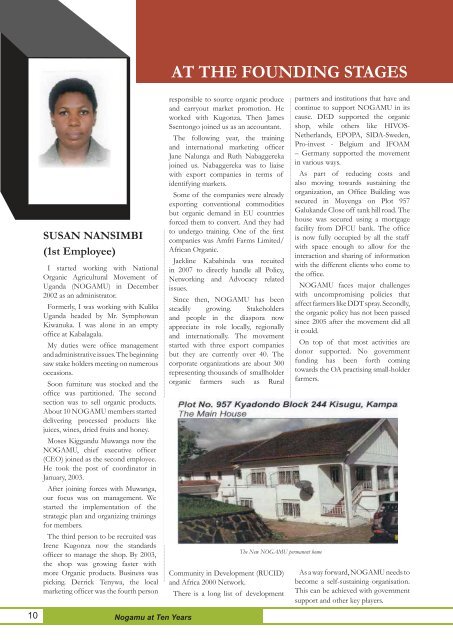Newsletter issue 33 - Nogamu
Newsletter issue 33 - Nogamu
Newsletter issue 33 - Nogamu
Create successful ePaper yourself
Turn your PDF publications into a flip-book with our unique Google optimized e-Paper software.
AT THE FOUNDING STAGES<br />
SUSAN NANSIMBI<br />
(1st Employee)<br />
I started working with National<br />
Organic Agricultural Movement of<br />
Uganda (NOGAMU) in December<br />
2002 as an administrator.<br />
Formerly, I was working with Kulika<br />
Uganda headed by Mr. Symphowan<br />
Kiwanuka. I was alone in an empty<br />
office at Kabalagala.<br />
My duties were office management<br />
and administrative <strong>issue</strong>s. The beginning<br />
saw stake holders meeting on numerous<br />
occasions.<br />
Soon furniture was stocked and the<br />
office was partitioned. The second<br />
section was to sell organic products.<br />
About 10 NOGAMU members started<br />
delivering processed products like<br />
juices, wines, dried fruits and honey.<br />
Moses Kiggundu Muwanga now the<br />
NOGAMU, chief executive officer<br />
(CEO) joined as the second employee.<br />
He took the post of coordinator in<br />
January, 2003.<br />
After joining forces with Muwanga,<br />
our focus was on management. We<br />
started the implementation of the<br />
strategic plan and organizing trainings<br />
for members.<br />
The third person to be recruited was<br />
Irene Kugonza now the standards<br />
officer to manage the shop. By 2003,<br />
the shop was growing faster with<br />
more Organic products. Business was<br />
picking. Derrick Tenywa, the local<br />
marketing officer was the fourth person<br />
responsible to source organic produce<br />
and carryout market promotion. He<br />
worked with Kugonza. Then James<br />
Ssentongo joined us as an accountant.<br />
The following year, the training<br />
and international marketing officer<br />
Jane Nalunga and Ruth Nabaggereka<br />
joined us. Nabaggereka was to liaise<br />
with export companies in terms of<br />
identifying markets.<br />
Some of the companies were already<br />
exporting conventional commodities<br />
but organic demand in EU countries<br />
forced them to convert. And they had<br />
to undergo training. One of the first<br />
companies was Amfri Farms Limited/<br />
African Organic.<br />
Jackline Kabahinda was recuited<br />
in 2007 to directly handle all Policy,<br />
Networking and Advocacy related<br />
<strong>issue</strong>s.<br />
Since then, NOGAMU has been<br />
steadily growing. Stakeholders<br />
and people in the diaspora now<br />
appreciate its role locally, regionally<br />
and internationally. The movement<br />
started with three export companies<br />
but they are currently over 40. The<br />
corporate organizations are about 300<br />
representing thousands of smallholder<br />
organic farmers such as Rural<br />
The New NOGAMU permanent home<br />
Community in Development (RUCID)<br />
and Africa 2000 Network.<br />
There is a long list of development<br />
partners and institutions that have and<br />
continue to support NOGAMU in its<br />
cause. DED supported the organic<br />
shop, while others like HIVOS-<br />
Netherlands, EPOPA, SIDA-Sweden,<br />
Pro-invest - Belgium and IFOAM<br />
– Germany supported the movement<br />
in various ways.<br />
As part of reducing costs and<br />
also moving towards sustaining the<br />
organization, an Office Building was<br />
secured in Muyenga on Plot 957<br />
Galukande Close off tank hill road. The<br />
house was secured using a mortgage<br />
facility from DFCU bank. The office<br />
is now fully occupied by all the staff<br />
with space enough to allow for the<br />
interaction and sharing of information<br />
with the different clients who come to<br />
the office.<br />
NOGAMU faces major challenges<br />
with uncompromising policies that<br />
affect farmers like DDT spray. Secondly,<br />
the organic policy has not been passed<br />
since 2005 after the movement did all<br />
it could.<br />
On top of that most activities are<br />
donor supported. No government<br />
funding has been forth coming<br />
towards the OA practising small-holder<br />
farmers.<br />
As a way forward, NOGAMU needs to<br />
become a self-sustaining organisation.<br />
This can be achieved with government<br />
support and other key players.<br />
10 <strong>Nogamu</strong> at Ten Years


